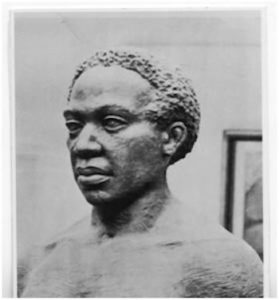
Samuel Sharpe
*This date in 1801 is celebrated as the birth date of Samuel Sharpe. Also known as Sam Sharpe, he was a Jamaican enslaved Black preacher and abolitionist.
Samuel Sharpe was born into slavery in the parish of St James, Jamaica. He was raised on a plantation owned by Samuel and Jane Sharpe. The 1817 slave records of Samuel and Jane Sharpe listed a 12-year-old Archer on the plantation with his mother, Juda Bligom, and siblings, Joe (2 years old) and Eliza (20 years old). Samuel Sharpe was allowed to become educated, and as a result, he was respected by other slaves. He became a well-known preacher and leader in the Baptist Church, which had long welcomed slaves as members and recognized them as preachers. He was a deacon at the Burchell Baptist Church in Montego Bay, whose pastor was Rev. Thomas Burchell, a missionary from England.
Sharpe spent most of his time traveling to different parishes in Jamaica, educating the slaves about Christianity, which he believed promised freedom. Slaves learned that the British Parliament was discussing the abolition of slavery; those who could read followed such news closely. In the mistaken belief that the British Parliament had already granted emancipation, Sharpe organized a peaceful general strike across many estates in western Jamaica to protest working conditions. As this was the sugar cane harvest, it was a critical time for the plantation owners: generally, the workforce had to work overtime to process the cane quickly at its peak.
Sharpe's peaceful protest evolved into Jamaica's largest slave rebellion, known as the Baptist War or Christmas Rebellion. It began at the Kensington Estate, lasted for ten days, and spread throughout the island, mobilizing as many as 60,000 Jamaican slaves. The colonial government used the armed Jamaican military forces and warriors from the towns of the Jamaican Maroons to suppress the rebellion within two weeks. Armed slave battalions killed some 14 whites, but troops killed more than 200 slaves. Afterward, more reprisals followed.
In the months leading up to his trial, while in jail, Sharpe had several meetings with Rev. Henry Bleby, a missionary, who reported that Sharpe told him: "I would rather die upon yonder gallows than live my life in slavery than live a slave." The rebellion and government response provoked two detailed Parliamentary Inquiries. The government tried, convicted, and hanged many ringleaders, including Samuel Sharpe, on May 23, 1832. The Slave Return of 1832 announcing his death gave his name as Archer, aka Samuel Sharpe, the son of Eve, and he was only 31 years old when he died. He was proclaimed a National Hero of Jamaica in 1975, and his image is on the $50 Jamaican banknote.